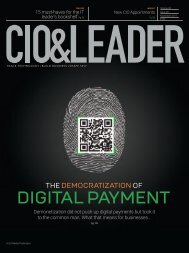white_paper_on_data_protection_in_india_171127_final_v2
Create successful ePaper yourself
Turn your PDF publications into a flip-book with our unique Google optimized e-Paper software.
Supreme Court op<strong>in</strong>ed that, ―the impact of the digital age results <strong>in</strong> <strong>in</strong>formati<strong>on</strong> <strong>on</strong> the<br />
Internet be<strong>in</strong>g permanent. Moreover, any endeavour to remove <strong>in</strong>formati<strong>on</strong> from the Internet<br />
may not result <strong>in</strong> its absolute obliterati<strong>on</strong>. It is thus, said that <strong>in</strong> the digital world<br />
preservati<strong>on</strong> is the norm and forgett<strong>in</strong>g a struggle. 639 People are not static; they are entitled<br />
to re-<strong>in</strong>vent themselves and correct their past acti<strong>on</strong>s. It is privacy which nurtures this ability<br />
and removes the shackles of unadvisable th<strong>in</strong>gs which may have been d<strong>on</strong>e <strong>in</strong> the past. ‖640<br />
Therefore, the recogniti<strong>on</strong> of the right to privacy envisages with<strong>in</strong> its c<strong>on</strong>tours the right to<br />
protect pers<strong>on</strong>al <strong>in</strong>formati<strong>on</strong> <strong>on</strong> the Internet. C<strong>on</strong>sequently, from this right, it follows, that<br />
any <strong>in</strong>dividual may have the derivative right to remove the ‗shackles of unadvisable past<br />
th<strong>in</strong>gs‘ <strong>on</strong> the Internet and correct past acti<strong>on</strong>s.<br />
10.2 Issues<br />
While there is an obvious need for the possibility to erase damag<strong>in</strong>g <strong>data</strong>, this right should not<br />
amount to rewrit<strong>in</strong>g history. It is essential that this right is balanced aga<strong>in</strong>st other fundamental<br />
rights like the freedom of expressi<strong>on</strong> or freedom of the press. Additi<strong>on</strong>ally, it is necessary to<br />
clarify which parties are required to act when the erasure of <strong>data</strong> is be<strong>in</strong>g requested.<br />
(i)<br />
C<strong>on</strong>flict with freedom of speech<br />
In a widely cited blog post, Peter Fleischer, chief privacy counsel of Google, noted that the<br />
right to be forgotten, as discussed <strong>in</strong> Europe, often covers three separate categories, each of<br />
which proposes progressively greater threats to free speech. 641<br />
a. ―If I post someth<strong>in</strong>g <strong>on</strong>l<strong>in</strong>e, do I have the right to delete it?‖<br />
b. ―If I post someth<strong>in</strong>g, and some<strong>on</strong>e else copies it and re-posts it <strong>on</strong> their own site, do I<br />
have the right to delete it?‖<br />
c. ―If some<strong>on</strong>e else posts someth<strong>in</strong>g about me, do I have a right to delete it?‖<br />
Therefore, the issue at hand is to what extent can the right to be forgotten be compatible with<br />
the right to freedom of speech and expressi<strong>on</strong> – whether it will cover <strong>on</strong>ly category <strong>on</strong>e, or<br />
will it cover both category <strong>on</strong>e and two, or will it cover all three categories.<br />
Accord<strong>in</strong>g to the EU GDPR, when some<strong>on</strong>e demands the erasure of pers<strong>on</strong>al <strong>data</strong>, an Internet<br />
Service Provider ―shall have the obligati<strong>on</strong> to erase pers<strong>on</strong>al <strong>data</strong> without undue delay‖,<br />
unless the retenti<strong>on</strong> of the <strong>data</strong> is necessary for exercis<strong>in</strong>g ―the right of freedom of<br />
expressi<strong>on</strong>.‖ 642 In another secti<strong>on</strong>, the regulati<strong>on</strong> creates an exempti<strong>on</strong> from the duty to<br />
639 Justice K.S. Puttaswamy (Retd.)& Anr. v. Uni<strong>on</strong> of India & Ors., (2017) 10 SCALE 1 at Paragraph 65; See,<br />
Ravi Antani, ‗The Resistance of memory: Could the European Uni<strong>on</strong>‘s Right to be Forgotten exist <strong>in</strong> the United<br />
States?‘ 30 Berkeley Tech Law Journal 1173 (2015), available at:<br />
http://scholarship.law.berkeley.edu/btlj/vol30/iss4/20/, (last accessed 21 October 2017).<br />
640 Justice K.S. Puttaswamy (Retd.)& Anr. v. Uni<strong>on</strong> of India & Ors., (2017) 10 SCALE 1.<br />
641 Jeffrey Rosen, ‗The Right to be Forgotten‘ 64 Stanford Law Review 90 (February 2012).<br />
642 Article 17, EU GDPR.<br />
138














